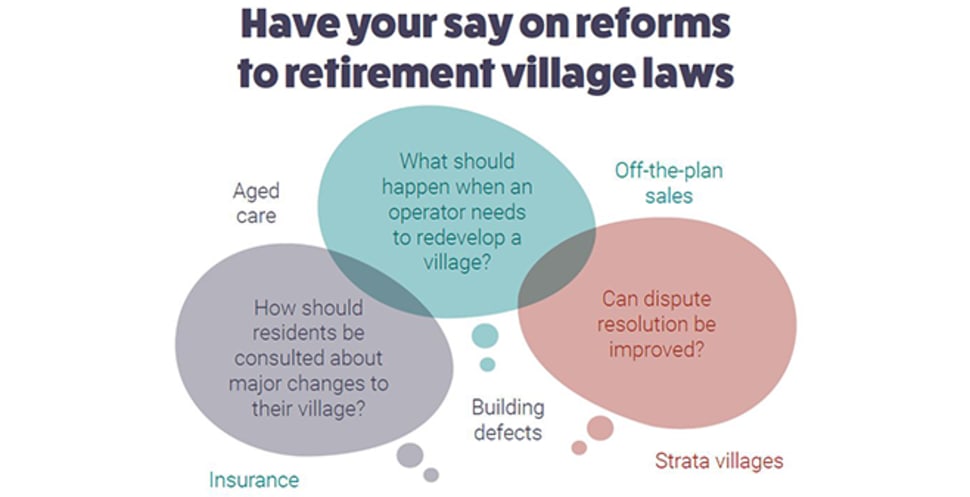Another week, another state looking to overhaul its village legislation.
The Western Australia Government has released the final consultation paper in Stage Two of its retirement villages’ legislation reform process in Western Australia, with the deadline for feedback set for 21 July – five weeks away.
It’s more time for operators to respond than they received for the last round of consultation in December last year, when only quick intervention by the Property Council – assisted by this story in The Weekly SOURCE – saw a plan for 12-month buybacks booted off the Minister’s table just before Christmas.
New process for managing village changes
The lengthy 122-page paper – titled ‘Consultation Regulatory Impact Statement 4 (CRIS 4)’ – includes proposals for:
- a new process to manage changes to a village,
- improving protections for consumers in ‘off the plan’ sales and leases, and
- looking at options to improve dispute resolution processes.
The paper proposes a new single process to apply when significant changes are proposed to be made to a village or the RV product; with:
- minimum requirements for resident consultation about the proposed change; and
- the State Administrative Tribunal (SAT) making all decisions and resolving all disputes that arise regarding the proposed change;
- the RV Act distinguishing the significant changes that will require resident consultation only and those that will require SAT oversight on the basis of the potential for impact on residents’ financial and tenure security; and
- the possibility of a simplified application for uncontested changes be explored with SAT.
The paper also floats changes to pre-contract disclosure, including pre-contract disclosure requirements only apply to the first residence contract that a prospective resident is asked to sign; and prospective residents be given at least 10 working days to consider any additional residence contracts that are not to be signed at the same time as the first one, plus consumer cooling-off rights for each contract.
Avoiding unnecessary RV Act application to village RACF residents
Intriguingly, the consultation also proposes the RV Act be applied to residential aged care facilities to avoid unnecessary duplication to village RACF residents that have their accommodation and services regulated under the Aged Care Act.
“It is not necessary for two Acts to regulate accommodation and services provided in an RACF,” the paper states. “This results in overlapping requirements and there is potential for inconsistency in what each Act requires.
“Overlapping and/or inconsistent requirements increase the regulatory burden for operators. This means the cost of providing the RV product and/or aged care services is higher, which increases the cost for residents. Overlapping and/or inconsistent regulation also confuses consumers. It is more difficult for them to identify and enforce their rights.”
WA’s RV Act was previously amended so that it did not apply when the Aged Care Act applied – but the paper indicates that the RV Act appears to be applying to aged care facilities in situations where it should not.
“Changes to the way residential aged care is delivered, funded and regulated raise the question of whether this exclusion needs updating.”
Changes needed to protect residents: Consumer Protection
“The intention is to ensure the proposed changes are suitable for new and emerging village models while maintaining the necessary protections for residents,” Commissioner for Consumer Protection Gary Newcombe said.
The consultation is also asking for feedback on issues relating to:
- strata title retirement villages and the overlap between the RV Act and the Strata Titles Act 1985 (WA),
- building defects,
- insurance contracts, and
- the provision of private home care services in retirement villages.
 M-L MacDonald (pictured right), RLC President and CEO of Masonic Care Western Australia, tells us that the Property Council will be developing a combined response in collaboration with LASA and ACSA to all of the four CRIS documents on behalf of the industry.
M-L MacDonald (pictured right), RLC President and CEO of Masonic Care Western Australia, tells us that the Property Council will be developing a combined response in collaboration with LASA and ACSA to all of the four CRIS documents on behalf of the industry.
“This has been a long process to date and there has been some concern from industry around some of the recommendations,” she stated.
“We’re hopeful now that after strong advocacy from the Property Council of Australia, with support from LASA and ACSA sensible outcomes can be achieved. The Department’s decision to commission economic modelling from WA Treasury Corporation, will very much help to achieve balanced reforms.”
“The ultimate goal of industry is to ensure that there is investor confidence that will enable Western Australians to have access to age-friendly communities into the future.”
Property Council seeking “streamlined” legislation around care
In response to the consultation on the role of care in villages, Ben Myers, Retirement Living Council Executive Director, told us:
“The Property Council has already started talking to governments to ensure that more care can be delivered more seamlessly in retirement villages. Our interest is to ensure a tight integration between the new Age Care Act and state retirement village legislation to enable residents to live independently for as a long as possible, and for operators to have options with respect to the care services they might choose to offer.
“That means we are seeking legislation that is streamlined and that does not cause an unnecessary administrative burden on operators. We also need legislation that does not add unnecessary costs for residents.
“The CRIS4 document gives industry an opportunity to outline the changes being driven by the introduction of new aged care funding arrangements.”
You can view the consultation paper here – comments close on 21 July 2021.










